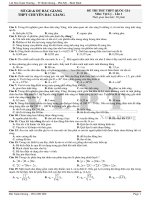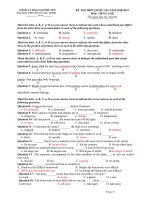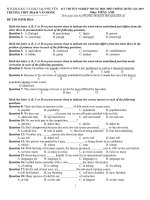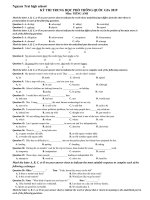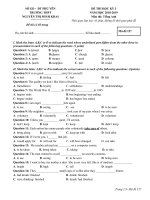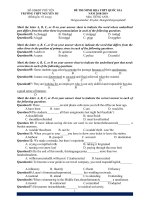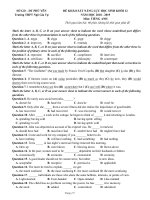Đề thi thử THPT QG môn tiếng anh năm 2019 THPT lương văn chánh
Bạn đang xem bản rút gọn của tài liệu. Xem và tải ngay bản đầy đủ của tài liệu tại đây (161.72 KB, 9 trang )
SỞ GD-ĐT PHÚ YÊN
ĐỀ THI ĐỀ NGHỊ THPT NĂM 2018-2019
THPT LƯƠNG VĂN CHÁNH
Bài thi: NGOẠI NGỮ; Môn thi: TIẾNG ANH
Thời gian làm bài: 60 phút, không kể thời gian phát đề
Mark the letter A, B, C, or D on your answer sheet to indicate the sentence that best completes each of the
following exchanges.
Question 1: Two visitors are talking to each other.
Visitor A : “Have you ever visited a World Heritage Site before ?”
Visitor B : “…………”
A. Well, this is actually the first time I’ve been to one.
B. It’s so interesting to be here with you.
C. It’s never too late to visit a place
D. I’ve been to a lot of interesting places of the world.
Question 2: - A : “Jenny is always late for appointments.”
- B : “Yes. ……………..”
A. But she is having an appointment.
B. But she will never be appointed to the position.
C. And the appointment is never late, too
D. And she always knows how to make an excuse
Mark the letter A, B, C, or D on your answer sheet to indicate the word(s) CLOSEST in meaning to the
underlined word(s) in each of the following questions.
Question 3: Thirteen people helped Michelangelo create his masterpiece on the ceiling of the Sistine Chapel.
A. an outdated product
B. an outstanding work
C. a beautiful song D. a persuasive speech
Question 4: Environmentalists fear that, if completed, the hydro-electric dam will severely disrupt the Danube
ecosystem.
A. upset
B. benefit
C. affect
D. improve
Mark the letter A, B, C, or D on your answer sheet to indicate the word(s) OPPOSITE in meaning to the
underlined word(s) in each of the following questions.
Question 5: Regulations and laws should be enacted for the preservation of natural resources in every corner of
the world.
A. applied
B. approved
C. removed
D. composed
Question 6: You should choose to buy energy efficient appliances as this can save energy as well as reduce both
costs and pollution.
A. using little energy B. being economical C. consuming a lot of energy D. being cheap and convenient
Mark the letter A, B, C, or D on your answer sheet to indicate the word whose underlined part differs from
the other three in pronunciation in each of the following questions.
Question 7: A. special
B. celebrate
C. excellent
D. receive
Question 8: A. composer
B. process
C. pop
D. post
Mark the letter A, B, C, or D on your answer sheet to indicate the word that differs from the other three in
the position of primary stress in each of the following questions.
Question 9: A. luxury
B. difficult
C. dangerous
D. musician
Question 10: A. gender
B. equal
C. household
D. promote
Mark the letter A, B, C, or D on your answer sheet to indicate the correct answer to each of the following
questions.
Question 11: "We're so pleased to meet you at last," he said in a …. ….. tone of voice.
A. respected
B. respectable
C. respectful
D. respect
Question 12 : If I……… it with my own eyes, I wouldn’t have believed it. But I did see it, and it was real.
A. wasn’t seeing
B. hadn’t seen
C. didn’t see
D. couldn’t see
Question 13 : We’ve been struggling with the same problem for years, and we still haven’t………. a solution.
A. come up with
B. come in for
C. come down on
D. raised up
Question 14 : The school principal proposed that Edward………. a scholarship.
A. be awarded
B. were awarded
C. is awarded
D. can be awarded
Question 15 : …….. received his prize than he left the podium.
A. No sooner he had
B. No sooner had he
C. Just as he had
D. He had just
Question 16 : She…….. fifty miles. Someone must have given her a lift.
A. mustn’t have walked
B. cannot have walked
C. hadn’t to watch
D. wasn’t to have walked
Question 17 : There is one person here tonight to….. I owe more than I can ever say.
A. whom
B. who
C. which
D. that
Question 18 : Don’t let……… to post the letters. They’re really important.
A. me forgetting
B. me to forget
C. that I forget
D. me forget
Question 19 : He is serving a…….. sentence for armed robbery.
A. ten-years
B. ten-year
C. ten-year’s
D. ten-years’
Question 20 : ………. James didn’t have the right qualifications, he was offered the job.
A. Although
B. Even so
C. Even that
D. No matter
Question 21 : The kids……… to get up this morning. It………. and it was cold, and their bed was so warm.
A. don’t want / is raining
B. are not wanting / rains
C. weren’t wanting / rained
D. didn’t want / was raining
Question 22 : ……… the wrong bus, Mark found himself in an unfamiliar part of the city.
A. Because taking
B. On taking
C. To take
D. Having taken
Mark the letter A, B, C, or D on your answer sheet to indicate the underlined part that needs correction in
each of the following questions.
Question 23 : Approximate 92 percent of the world’s trading goods are transported by ships.
A
B
C
D
Question 24 : With its thousands of rocks and caves emerged out of the water, Ha Long Bay has won
A
B
C
international recognition.
D
Question 25 : Either the United States silver dollar and half-dollar, first minted in 1794, had a figure of Liberty
A
B
C
on one side and an eagle on the reverse side.
D
Mark the letter A, B, C, or D on your answer sheet to indicate the sentence that is closest in meaning to each
of the following questions.
Question 26 : Nine volunteers were recruited to take part in the study.
A. The study attracted nine volunteers to take part in
B. They recruited nine volunteers to take part in the study.
C. All the nine recruited volunteers took part in the study.
D. The recruitment of nine volunteers helped the study a lot.
Question 27 : You should take in more fruits and vegetables instead of eating too much fast food.
A. Eating too much fast food a day and taking in more fruits and vegetables are advisable.
B. Don’t take in more fruits and vegetables, just eat too much fast food instead.
C. Eating too much fast food helps you take in more fruits and vegetables.
D. Taking in more fruits and vegetables is better than eating too much fast food.
Question 28 : “Have your seat, please.” said the interviewer to him.
A. The interviewer invited him to sit down.
B. The interviewer offers him a post.
C. The interviewer asked him where his seat was.
D. The interviewer left him a seat.
Mark the letter A, B, C, or D on your answer sheet to indicate the sentence that best combines each pair of
sentences in the following questions.
Question 29 : Trees should be planted everywhere possible. Trees absorb carbon dioxide, a greenhouse gas.
A. Trees, which should be planted everywhere possible, absorb carbon dioxide, a greenhouse gas.
B. Trees should be planted everywhere possible as they absorb carbon dioxide, a greenhouse gas.
C. Trees should be planted everywhere possible to be able to absorb carbon dioxide, a greenhouse gas.
D. Trees should be planted everywhere possible where they absorb carbon dioxide, a greenhouse gas.
Question 30 : You can’t master a language in a month. It is impossible.
A. It is just a matter of time before you can master a language.
B. It is reasonable for a language to be mastered in a month.
C. It is so practical of you to master a language in a month.
D. It is impossible for you to master a language in a month.
Read the following passage and mark the letter A, B, C, or D on your answer sheet to indicate the correct
word or phrase that best fits each of the numbered blanks from 31 to 35.
Eco-Friendly Living
Too many of us go home at night so unaware of how much energy we waste. OK, so we might turn
(31)………the standby button on the TV these days or use energy-saving light-bulbs but how many of us
would change our house to make it eco-friendly? Matthew Bennett would. In fact he thought it was such a good
idea that he totally rebuilt it, making his four-bedroom home into one of the most eco-friendly in any Canadian
urban area.
From the street the house looks like a typical home in the middle of a suburban neighbourhood. (32)..…
from the wind turbine perched on the roof you wouldn't really know it was any different. But hidden below the
ground underneath his basement there is a 50,000-litre tank (33) ..…. catches enough rain to supply all of his
water. Any water from washing machines, showers and other household (34)..…..is recycled through filters and
ponds and then re-used on a small orchard because instead of grass, plants and flowers he has planted trees.
The biggest benefit for Mr Bennett is that he has virtually no water or energy bills. The wind turbine,
(35) ……… panels and small biodiesel generator provide nearly 100% of his household requirements.
Question 31. A. of
B. on
C. away
D. off
Question 32. A. Apart
B. However
C. Although
D. Along
Question 33. A. it
B. when
C. which
D. what
Question 34. A. appliances
B. technology
C. goods
D. furniture
Question 35. A. solar
.
B sun
C. wood
D. bright
Read the following passage and mark the letter A, B, C, or D on your answer sheet to indicate the
correct answer to each of the questions from 36 to 43.
Family in the 21st century come in all shapes and sizes: traditional, single parent, blended (more than
one family together in the same house), and gay and lesbian parents – just to name a few. No matter what "type"
of family you have, there are going to be highs and lows – good times and bad.
Many times, however, families become blocked in their relationships by hurt, anger, mistrust, and
confusion. These emotions are natural and normal, and few families do not have at least a few experiences with
them. The worst time for most families, is during a divorce.
By making a few simple changes in the way we look at the world and deal with other people, it is
possible to create happier, more stable relationships. Families need to be units of mutual caring and support;
they can be sources of lifelong strength for all individuals.
It is never too late to begin the process of improving family relationships – even if they are already of
good quality – by developing some simple skills.
Whereas in other situations you can step back and assess the relationship, it is often hard to do this with
your family. Your family may be a constant presence in your life, so when an argument or issue arises, it may
seem impossible to handle.
Remember that communication is the key to resolving conflict. While it may seem that your siblings are
constantly present to annoy you or boss you around, they are also there to communicate.
Use your family's presence to your advantage – communicate with each other, develop ways to value
boundaries, and build trust and respect.
Question 36 : The passage mainly discusses………
A. families in the 21st century
B. how to keep and improve family relationships.
C. what changes to make for a happier family
D. family problems and solutions in the 21st century
Question 37 : Which of the following is not listed as something that blocks family relationships ?
A. mistrust
B. divorce
C. bankruptcy
D. confusion
Question 38 : The word “them” in the passage refers to……..
A. families
B. emotions
C. relationships
D. times
Question 39 : The word “units” in the passage almost means ………
A. places
B. situations
C. people
D. times
Question 40 : Which of the following is NOT true according to the passage ?
A. All families experience both good and bad times.
B. Family care and support make individuals strong.
C. Good family relationships need no improvements.
D. Normally, it is hard to assess family relationships.
Question 41 : The word “handle” in the passage almost means ………
A. hold
B. share
C. control
D. solve
Question 42 : According to the passage, which of the following is the best way to deal with family problems?
A. Making changes to create happier, more stable relationships.
B. Communicating among family members for better understanding.
C. Developing some simple skills to assess family relationships.
D. Valuing boundaries, and building trust and respect among family members.
Read the following passage and mark the letter A, B, C, or D on your answer sheet to indicate the correct
answer to each of the questions from 43 to 50.
Further education in Britain means education after the General Certificate of Secondary Education
(GCSE) and General National Vocational Qualifications (GNVQ) exams taken around the age of 16. It
includes courses of study leading to A levels which students take at their school or sixth-form college. Some
students go straight to a college of further education which offers a wider range of full-and part-time courses.
Further education also includes training for professional qualifications in nursing, accountancy and
management, and in fields such as art and music. The term higher education is used in Britain and the US to
refer to degree courses at universities.
In the US, further education usually means any other education after secondary school. It can mean
study at college, or any study towards a professional qualification, and it can have a meaning similar to that of
adult education or continuing education, i.e. something that people do after completing their main education,
often for personal interest and satisfaction.
Many students in Britain take vocational training courses in fields such as building, engineering, hairdressing or secretarial skills. Colleges of further education offer courses leading to National Vocational
Qualifications (GNVQ) and other certificates and diplomas. Work-related courses are designed with advice
from industry, with the aim of producing students who will have the skills employers require. On longer courses
students may do placements (AmE internships) (= periods of work) lasting several months with companies. On
other courses, called sandwich courses, students divide their time between periods of paid work and periods of
study. A common arrangement is for students to get day release from their work to attend college one or two
days a week over several years. Some students do a formal apprenticeship, learning their skills on the job and
attending college part-time.
The British government is keen to persuade more young people to remain in education as long as
possible to build up a more highly skilled, better educated workforce. About 3.9 million people take part-time
further education courses, while another 1.1 million are full-time students.
Question 43 : The best title for the passage could be………..
A. Further Education in Britain
B. Higher Education in the US
C. Higher Education in Britain
D. Further Education in the US
Question 44 : The word "which" in the passage refers to …….
.
A. courses of study
B. A levels
C. further education D. GCSE and FNVQ exams
Question 45 : The word "It" in the passage refers to……….
A. further education
B. study at college
C. adult education
D. continuing education
Question 46 : Which of the following is true according to the passage?
A. Higher education in the UK provides non-degree courses in professional training.
B. In the US, when you do self-study, you are doing further education.
C. Vocational training courses are neither included in further nor higher education.
D. In Britain, people can work and take further educations courses at the same time.
Question 47 : The phrase "day release" in the passage almost means……..
A. having the day off
B. the Independence Day
C. a day out of work D. a hard working day
Question 48 : Which of the following is true according to the passage?
A. British workers are better trained than their American fellows.
B. In Britain, vocational training courses are practically job-related.
C. In America, vocational training courses charge no fee at all.
D. Taking vocational courses makes it easier for people to find a job.
Question 49 : Which of the following can best describe Britain's workforce according to the passage ?
A. well-informed
B. well-trained
C. well-paid
D.well-known
Question 50 : The passage is most likely taken from………..
A. a textbook for secondary school students
C. a guidebook to British and American culture
B. a brochure for foreign visitors to Britain
D. a journal for educational experts in the UK and US.
KEY:
ĐỀ THI ĐỀ NGHỊ THPT NĂM 2018-2019
THPT LƯƠNG VĂN CHÁNH
Bài thi: NGOẠI NGỮ; Môn thi: TIẾNG ANH
Thời gian làm bài: 60 phút, không kể thời gian phát đề
1. A
2.D
3.B
4.A
5.C
6.C
7.A
8.C
9.D
11. C
12.B
13.A
14.A
15.B 16.B
17.A
18.D 19.B
21.D
22.D
23.A
24.B
25.A 26.B
27.D
28.A 29.B
31.D
32.A
33.C
34.A
35.A 36.B
37.C
38.B 39.A
41.D
42.B
43.A
44.B
45.A 46.D
47.A
48.B 49.B
10.D
20.A
30.D
40.C
50.C
KEY: SỞ GD-ĐT PHÚ YÊN
ĐỀ THI ĐỀ NGHỊ THPT NĂM 2018-2019
THPT LƯƠNG VĂN CHÁNH
Bài thi: NGOẠI NGỮ; Môn thi: TIẾNG ANH
Thời gian làm bài: 60 phút, không kể thời gian phát đề
Mark the letter A, B, C, or D on your answer sheet to indicate the sentence that best completes each of the
following exchanges.
Question 1: Two visitors are talking to each other.
Visitor A : “Have you ever visited a World Heritage Site before ?”
Visitor B : “…………”
A. Well, this is actually the first time I’ve been to one.
B. It’s so interesting to be here with you.
C. It’s never too late to visit a place
D. I’ve been to a lot of interesting places of the world.
Question 2: - A : “Jenny is always late for appointments.”
- B : “Yes. ……………..”
A. But she is having an appointment.
B. But she will never be appointed to the position.
C. And the appointment is never late, too
D. And she always knows how to make an excuse
Mark the letter A, B, C, or D on your answer sheet to indicate the word(s) CLOSEST in meaning to the
underlined word(s) in each of the following questions.
Question 3: Thirteen people helped Michelangelo create his masterpiece on the ceiling of the Sistine Chapel.
A. an outdated product
B. an outstanding work
C. a beautiful song D. a persuasive speech
Question 4: Environmentalists fear that, if completed, the hydro-electric dam will severely disrupt the Danube
ecosystem.
A. upset
B. benefit
C. affect
D. improve
Mark the letter A, B, C, or D on your answer sheet to indicate the word(s) OPPOSITE in meaning to the
underlined word(s) in each of the following questions.
Question 5: Regulations and laws should be enacted for the preservation of natural resources in every corner of
the world.
A. applied
B. approved
C. removed
D. composed
Question 6: You should choose to buy energy efficient appliances as this can save energy as well as reduce both
costs and pollution.
A. using little energy B. being economical C. consuming a lot of energy D. being cheap and convenient
Mark the letter A, B, C, or D on your answer sheet to indicate the word whose underlined part differs from
the other three in pronunciation in each of the following questions.
Question 7: A. special
B. celebrate
C. excellent
D. receive
Question 8: A. composer
B. process
C. pop
D. post
Mark the letter A, B, C, or D on your answer sheet to indicate the word that differs from the other three in
the position of primary stress in each of the following questions.
Question 9: A. luxury
B. difficult
C. dangerous
D. musician
Question 10: A. gender
B. equal
C. household
D. promote
Mark the letter A, B, C, or D on your answer sheet to indicate the correct answer to each of the following
questions.
Question 11: "We're so pleased to meet you at last," he said in a …. ….. tone of voice.
A. respected
B. respectable
C. respectful
D. respect
Question 12 : If I……… it with my own eyes, I wouldn’t have believed it. But I did see it, and it was real.
A. wasn’t seeing
B. hadn’t seen
C. didn’t see
D. couldn’t see
Question 13 : We’ve been struggling with the same problem for years, and we still haven’t………. a solution.
A. come up with
B. come in for
C. come down on
D. raised up
Question 14 : The school principal proposed that Edward………. a scholarship.
A. be awarded
B. were awarded
C. is awarded
D. can be awarded
Question 15 : …….. received his prize than he left the podium.
B. No sooner he had
B. No sooner had he
C. Just as he had
D. He had just
Question 16 : She…….. fifty miles. Someone must have given her a lift.
A. mustn’t have walked
B. cannot have walked
C. hadn’t to watch
D. wasn’t to have walked
Question 17 : There is one person here tonight to….. I owe more than I can ever say.
A. whom
B. who
C. which
D. that
Question 18 : Don’t let……… to post the letters. They’re really important.
A. me forgetting
B. me to forget
C. that I forget
D. me forget
Question 19 : He is serving a…….. sentence for armed robbery.
A. ten-years
B. ten-year
C. ten-year’s
D. ten-years’
Question 20 : ………. James didn’t have the right qualifications, he was offered the job.
A. Although
B. Even so
C. Even that
D. No matter
Question 21 : The kids……… to get up this morning. It………. and it was cold, and their bed was so warm.
A. don’t want / is raining
B. are not wanting / rains
C. weren’t wanting / rained
D. didn’t want / was raining
Question 22 : ……… the wrong bus, Mark found himself in an unfamiliar part of the city.
A. Because taking
B. On taking
C. To take
D. Having taken
Mark the letter A, B, C, or D on your answer sheet to indicate the underlined part that needs correction in
each of the following questions.
Question 23 : Approximate 92 percent of the world’s trading goods are transported by ship.
A
B
C
D
A _ Approximately
Question 24 : With its thousands of rocks and caves emerged out of the water, Ha Long Bay has won
A
B
C
international recognition. (B __ emerging)
D
Question 25 : Either the United States silver dollar and half-dollar, first minted in 1794, had a figure of Liberty
A
B
C
on one side and an eagle on the reverse side. (A__ Both)
D
Mark the letter A, B, C, or D on your answer sheet to indicate the sentence that is closest in meaning to each
of the following questions.
Question 26 : Nine volunteers were recruited to take part in the study.
A. The study attracted nine volunteers to take part in
B. They recruited nine volunteers to take part in the study.
C. All the nine recruited volunteers took part in the study.
D. The recruitment of nine volunteers helped the study a lot.
Question 27 : You should take in more fruits and vegetables instead of eating too much fast food.
A. Eating too much fast food a day and taking in more fruits and vegetables are advisable.
B. Don’t take in more fruits and vegetables, just eat too much fast food instead.
C. Eating too much fast food helps you take in more fruits and vegetables.
D. Taking in more fruits and vegetables is better than eating too much fast food.
Question 28 : “Have your seat, please.” said the interviewer to him.
A. The interviewer invited him to sit down.
B. The interviewer offers him a post.
C. The interviewer asked him where his seat was.
D. The interviewer left him a seat.
Mark the letter A, B, C, or D on your answer sheet to indicate the sentence that best combines each pair of
sentences in the following questions.
Question 29 : Trees should be planted everywhere possible. Trees absorb carbon dioxide, a greenhouse gas.
A. Trees, which should be planted everywhere possible, absorb carbon dioxide, a greenhouse gas.
B. Trees should be planted everywhere possible as they absorb carbon dioxide, a greenhouse gas.
C. Trees should be planted everywhere possible to be able to absorb carbon dioxide, a greenhouse gas.
D. Trees should be planted everywhere possible where they absorb carbon dioxide, a greenhouse gas.
Question 30 : You can’t master a language in a month. It is impossible.
A. It is just a matter of time before you can master a language.
B. It is reasonable for a language to be mastered in a month.
C. It is so practical of you to master a language in a month.
D. It is impossible for you to master a language in a month.
Read the following passage and mark the letter A, B, C, or D on your answer sheet to indicate the correct
word or phrase that best fits each of the numbered blanks from 31 to 35.
Eco-Friendly Living
Too many of us go home at night so unaware of how much energy we waste. OK, so we might turn
(31)………the standby button on the TV these days or use energy-saving light-bulbs but how many of us
would change our house to make it eco-friendly? Matthew Bennett would. In fact he thought it was such a good
idea that he totally rebuilt it, making his four-bedroom home into one of the most eco-friendly in any Canadian
urban area.
From the street the house looks like a typical home in the middle of a suburban neighbourhood. (32)..…
from the wind turbine perched on the roof you wouldn't really know it was any different. But hidden below the
ground underneath his basement there is a 50,000-litre tank (33) ..…. catches enough rain to supply all of his
water. Any water from washing machines, showers and other household (34)..…..is recycled through filters and
ponds and then re-used on a small orchard because instead of grass, plants and flowers he has planted trees.
The biggest benefit for Mr Bennett is that he has virtually no water or energy bills. The wind turbine,
(35) ……… panels and small biodiesel generators provide nearly 100% of his household requirements.
Question 31. A. of
B. on
C. away
D. off
Question 32. A. Apart
B. However
C. Although
D. Along
Question 33. A. it
B. when
C. which
D. what
Question 34. A. appliances
B. technology
C. goods
D. furniture
Question 35. A. solar
.
B sun
C. wood
D. bright
Read the following passage and mark the letter A, B, C, or D on your answer sheet to indicate thecorrect
answer to each of the questions from 36 to 43.
Family in the 21st century come in all shapes and sizes: traditional, single parent, blended (more than
one family together in the same house), and gay and lesbian parents – just to name a few. No matter what "type"
of family you have, there are going to be highs and lows – good times and bad.
Many times, however, families become blocked in their relationships by hurt, anger, mistrust, and
confusion. These emotions are natural and normal, and few families do not have at least a few experiences with
them. The worst time for most families, is during a divorce.
By making a few simple changes in the way we look at the world and deal with other people, it is
possible to create happier, more stable relationships. Families need to be units of mutual caring and support;
they can be sources of lifelong strength for all individuals.
It is never too late to begin the process of improving family relationships – even if they are already of
good quality – by developing some simple skills.
Whereas in other situations you can step back and assess the relationship, it is often hard to do this with
your family. Your family may be a constant presence in your life, so when an argument or issue arises, it may
seem impossible to handle.
Remember that communication is the key to resolving conflict. While it may seem that your siblings are
constantly present to annoy you or boss you around, they are also there to communicate.
Use your family's presence to your advantage – communicate with each other, develop ways to value
boundaries, and build trust and respect.
Question 36 : The passage mainly discusses………
A. families in the 21st century
B. how to keep and improve family relationships.
C. what changes to make for a happier family
D. family problems and solutions in the 21st century
Question 37 : Which of the following is not listed as something that blocks family relationships ?
A. mistrust
B. divorce
C. bankruptcy
D. confusion
Question 38 : The word “them” in the passage refers to……..
A. families
B. emotions
C. relationships
D. times
Question 39 : The word “units” in the passage almost means ………
A. places
B. situations
C. people
D. times
Question 40 : Which of the following is NOT true according to the passage ?
A. All families experience both good and bad times.
B. Family care and support make individuals strong.
C. Good family relationships need no improvements.
D. Normally, it is hard to assess family relationships.
Question 41 : The word “handle” in the passage almost means ………
A. hold
B. share
C. control
D. solve
Question 42 : According to the passage, which of the following is the best way to deal with family problems?
A. Making changes to create happier, more stable relationships.
B. Communicating among family members for better understanding.
C. Developing some simple skills to assess family relationships.
D. Valuing boundaries, and building trust and respect among family members.
Read the following passage and mark the letter A, B, C, or D on your answer sheet to indicate the correct
answer to each of the questions from 43 to 50.
Further education in Britain means education after the General Certificate of Secondary
Education (GCSE) and General National Vocational Qualifications (GNVQ) exams taken around the age of 16.
It includes courses of study leading to A levels which students take at their school or sixth-form college. Some
students go straight to a college of further education which offers a wider range of full-and part-time courses.
Further education also includes training for professional qualifications in nursing, accountancy and
management, and in fields such as art and music. The term ‘higher education’ is used in Britain and the US to
refer to degree courses at universities.
In the US, further education usually means any other education after secondary school. It can mean
study at college, or any study towards a professional qualification, and it can have a meaning similar to that of
adult education or continuing education, i.e. something that people do after completing their main education,
often for personal interest and satisfaction.
Many students in Britain take vocational training courses in fields such as building, engineering, hairdressing or secretarial skills. Colleges of further education offer courses leading to National Vocational
Qualifications (GNVQ) and other certificates and diplomas. Work-related courses are designed with advice
from industry, with the aim of producing students who will have the skills employers require. On longer courses
students may do placement (AmE internships) (= periods of work) lasting several months with companies. On
other courses, called sandwich courses, students divide their time between periods of paid work and periods of
study. A common arrangement is for students to get day release from their work to attend college one or two
days a week over several years. Some students do a formal apprenticeship, learning their skills on the job and
attending college part-time.
The British government is keen to persuade more young people to remain in education as long as
possible to build up a more highly skilled, better educated workforce. About 3.9 million people take part-time
further education courses, while another 1.1 million are full-time students.
Question 43 : The best title for the passage could be………..
A. Further Education in Britain
B. Higher Education in the US
C. Higher Education in Britain
D. Further Education in the US
Question 44 : The word "which" in the passage refers to …….
.
A. courses of study
B. A levels
C. further education D. GCSE and FNVQ exams
Question 45 : The word "It" in the passage refers to……….
A. further education
B. study at college
C. adult education
D. continuing education
Question 46 : Which of the following is true according to the passage?
A. Higher education in the UK provides non-degree courses in professional training.
B. In the US, when you do self-study, you are doing further education.
C. Vocational training courses are neither included in further nor higher education.
D. In Britain, people can work and take further education courses at the same time.
Question 47 : The phrase "day release" in the passage almost means……..
A. having the day off
B. the Independence Day
C. a day out of work D. a hard working day
Question 48 : Which of the following is true according to the passage?
A. British workers are better trained than their American fellows.
B. In Britain, vocational training courses are practically job-related.
C. In America, vocational training courses charge no fee at all.
D. Taking vocational courses makes it easier for people to find a job.
Question 49 : Which of the following can best describe Britain's workforce according to the passage ?
A. well-informed
B. well-trained
C. well-paid
D. well-known
Question 50 : The passage is most likely taken from………..
A. a textbook for secondary school students
B. a brochure for foreign visitors to Britain
C. a guidebook to British and American culture D. a journal for educational experts in the UK and US.



